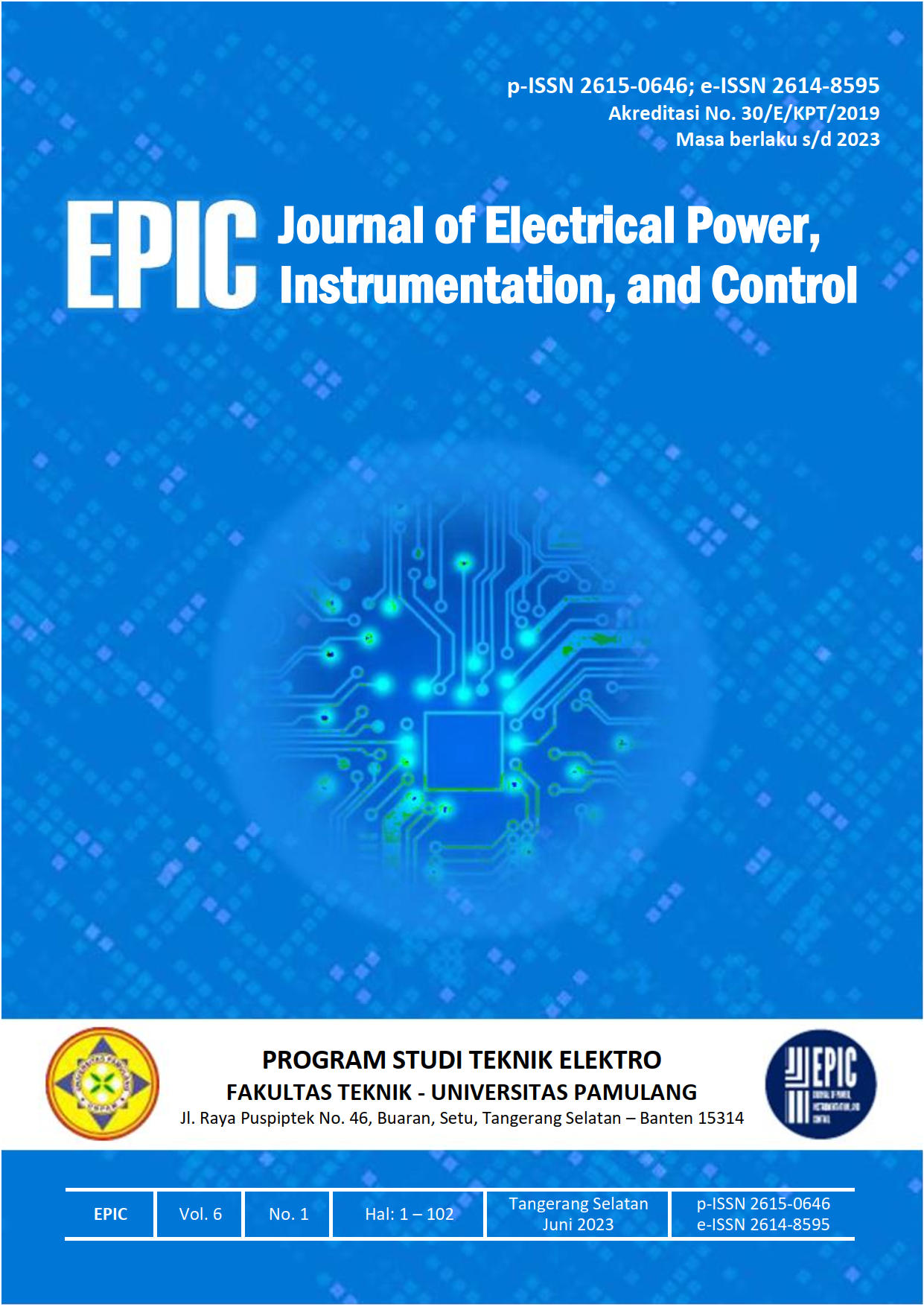Implementation of Solar Cells as Single Axis Solar Tracker
DOI:
https://doi.org/10.32493/epic.v6i1.29297Keywords:
solar radiation, solar cell, arduino, servo motor, solar trackerAbstract
A solar cell is a semiconductor element that can convert solar energy into electrical energy on the basis of the photovoltaic effect. The solar module is a collection of several solar cells. The power generated by solar cells is influenced by the level of solar radiation and ambient air temperature, the lower the solar radiation, the lower the power generated. So that the power generated by solar cells is always optimal, it is necessary to adjust the position of the sun's light to vary the intensity of solar radiation. The system used for such regulation is called a solar tracker system. This research discusses the performance of solar trackers with solar cells as sensors. The solar tracker captures direct light, the voltage is processed by Arduino and the servo motor acts as a drive to adjust the direction of the solar cell to a direction perpendicular to the sun's light. The input of the system is the position of the sunlight and the output is the direction of the solar cell in degrees. This sun tracking system can show a stable response to the movement of solar cells in accordance with the perpendicular position of sunlight so that the power generated by solar cells can be more optimal. This research succeeded in functioning solar cells as solar tracking sensors.
References
Abadi, I., Soeprijanto, A., & Musyafa, A. (2014). Design of Single Axis Solar Tracking System at Photovoltaic Panel Using Fuzzy Logic Controller. https://doi.org/10.1049/cp.2014.1086
Adi Widodo, D. (2009). Pemberdayaan Energi Matahari Sebagai Energi Listrik Lampu Pengatur Lalu Lintas.
Alexandru, C. (2016). Mono-Objective Optimization of a Photovoltaic Tracking System with LPF Controllers. Applied Mechanics and Materials, 823, 7–12. https://doi.org/10.4028/www.scientific.net/amm.823.7
Amri, U. (2011). Globalisasi dan Dampaknya terhadap Lingkungan dan Keamanan Manusia di Asia Pasifik: Kasus China dan Papua Nugini. 2(1), 56–71.
Arduino. (2023). Arduino Overview. Https://Store.Arduino.Cc/Products/Arduino-Uno-Rev3.
Bandri, S., Andari, R., & Tias, F. N. (2021). Pengaruh Intensitas Cahaya Matahari Terhadap Tegangan Dan Arus Yang Dihasilkan Panel Surya. Jurnal Teknik Elektro Institut Teknologi Padang, 10(2), 106–113. https://doi.org/10.21063/JTE.2021.31331016
Elektronika Dasar. (2023, March 20). Motor Servo. Https://Elektronika-Dasar.Web.Id/Motor-Servo/.
Ervin, M., & Jamaaluddin. (2020). Pemanfaatan Sel surya Sebagai Alternatif Energi Listrik Skala Rumah Tangga.
Usman, M. K. (2020). Analisis Intensitas Cahaya Terhadap Energi Listrik Yang Dihasilkan Panel Surya. Jurnal Polektro: Jurnal Power Elektronik, 9(2), 52–58.
http://ejournal.poltektegal.ac.id/index.php/powerelektro
Lee, C. Y., Chou, P. C., Chiang, C. M., & Lin, C. F. (2009). Sun tracking systems: A review. In Sensors (Vol. 9, Issue 5, pp. 3875–3890). https://doi.org/10.3390/s90503875
Lewis, R. W. (2016). Buku Panduan Energi yang Terbarukan.
Morón, C., Ferrández, D., Saiz, P., Vega, G., & DÃaz, J. P. (2017). New prototype of photovoltaic solar tracker based on arduino. Energies, 10(9). https://doi.org/10.3390/en10091298
Muner, M. (2021). Pemanfaatan Energi Matahari Melalui Panel Surya Dengan Beban Mesin Pengering Larva BSF [Skripsi]. Universitas Yudharta Pasuruan.
Rosiana, E., Baskhara, H. A., & Megasari, D. (2022). Pelacak Surya Satu Sumbu Dengan Sensor Sel surya.
Rozak, O. A., Juhana, & Arrosyid, B. (2022). Nilai Keuntungan Dari Pembangunan Pembangkit Listrik Tenaga Surya Atap On-Grid 100 kWp Unpam Viktor. Journal of Electrical Power, Instrumentation and Control) Teknik Elektro-Universitas Pamulang, 5(1), 81–88. https://doi.org/10.32493/epic.v5i1.23097
Wiraatmaja, I. W. (2017). Suhu, Energi Matahari, dan Air Dalam Hubungan Dengan Tanaman.
Downloads
Published
How to Cite
Issue
Section
License
This journal provides immediate open access to its content on the principle that making research freely available to the public, supporting a greater global exchange of knowledge.

Journal of Electrical Power, Instrumentation and Control adhere to Attribution-ShareAlike 4.0 International license.
Journal of Electrical Power, Instrumentation and Control menganut lisensi Atribusi-BerbagiSerupa 4.0 Internasional.


















